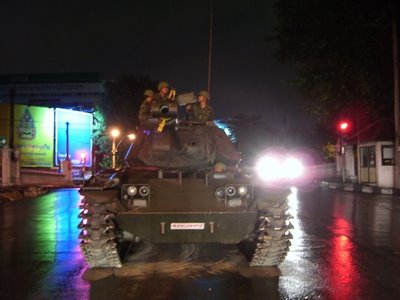Certain Russian parallels to the recent attacks on Mumbai inform Russian Jotman reader Sanjuro's interpretation of events in India. In particular, Sanjuro has been pondering whether Pakistan might have played a role in the attacks on Mumbai. Sanjuro writes:
To me, the timing of the attacks could not be more unfortunate for the most of the official Pakistani establishment. Having just survived a severe political crisis and fighting their own islamist insurgents in the north, the last thing they would need was a deterioration of relations with India. What do you think about this?I think Sanjuro raises an important -- and quite general -- point here.I have doubts because I have parallels with Russia. In the aftermath of the Nord-Ost and Beslan school hostage crises, Putin et al were too quick to blame "forces outside the country", - it just seems like a typical pattern.I was amazed just how badly equipped some of the Indian rapid response teams were: no bullet-proof vest, no communication, some riot gear totally useless in the situation, standard army issue rifles hardly appropriate in a crowded city. . . .
Certainly, if India's leaders are anything like their recent American counterparts, they will tend to downplay the vital question of domestic preparedness and exploit the tragedy as a means by which to consolidate public support for whatever policies would further their own ambitions.
UPDATE: Sanjuro has forwarded me a further comment:
. . . Indian public opinion perhaps makes this case different from the Russian incidents. I recall that in Russia in 2002 (Nord-Ost siege) and 2004 (Beslan school) although the authorities were quick to suspect foreign roots, public opinion generally linked the events to the homegrown Chechen guerrillas (not exactly correctly, as it turned out in the Beslan case). I read some Indian comments on the Economist, FT etc and although they appear to be quite moderate towards Pakistan, my sample is unlikely to be representative of the general mood of the populace.An Indian blogger I quoted here observed that "94.6% of sixty thousand respondents at NDTV.com say it is time for India to enact stringent laws to curb terror." I doubt the survey was scientific, and in the immediate aftermath most citizens could be expected to emphasize security.
I think the example of the United States and the excesses under Bush sets a "healthy bad example" that Indians can point to in working out their own response to the tragedy. To paraphrase what French Pres. Sarkozy supposedly told Putin in early August: "You could simply go in and conquer all of Georgia, but then you would probably end up like George Bush."


















